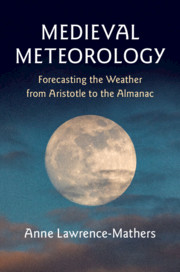Book contents
- Medieval Meteorology
- Medieval Meteorology
- Copyright page
- Contents
- Preface
- Acknowledgements
- Introduction
- 1 Recreating Meteorology in the Early Middle Ages
- 2 Meteorology, Weather Forecasting and the Early Medieval Renaissance of Astronomy
- 3 Exploratory Encounters with the Work of Arab Astronomers and Meteorologists
- 4 Meteorology, the New Science of the Stars and the Rise of Weather Forecasting
- 5 The Contested Rise of Astrometeorology
- 6 Applying the Science of Astrometeorology
- 7 Astrometeorology and Mechanisation
- 8 Weather Forecasting and the Impact of Print
- Conclusion
- Bibliography
- Index
8 - Weather Forecasting and the Impact of Print
Published online by Cambridge University Press: 08 November 2019
- Medieval Meteorology
- Medieval Meteorology
- Copyright page
- Contents
- Preface
- Acknowledgements
- Introduction
- 1 Recreating Meteorology in the Early Middle Ages
- 2 Meteorology, Weather Forecasting and the Early Medieval Renaissance of Astronomy
- 3 Exploratory Encounters with the Work of Arab Astronomers and Meteorologists
- 4 Meteorology, the New Science of the Stars and the Rise of Weather Forecasting
- 5 The Contested Rise of Astrometeorology
- 6 Applying the Science of Astrometeorology
- 7 Astrometeorology and Mechanisation
- 8 Weather Forecasting and the Impact of Print
- Conclusion
- Bibliography
- Index
Summary
Chapter 8 sets out the evidence for the growing prestige of, and demand, for, astrometeorological forecasts in the fifteenth century. It traces the establishment of chairs in astronomy and astrology in universities old and new across Europe, and looks at the forecasts issued by the holders. The rapid creation of annual almanacs, based on these forecasts, and the demand for affordable, printed copies, are outlined. The important works of Abraham Zacut, Regiomontanus, the Laet family, and Leonard Digges, are all discussed in detail. The numbers of printed editions, their price levels, and their success, are all considered as evidence of demand for updated, ever more accurate, versions of astrometeorology. Digges’ work is shown to have addressed a readership keen to make their own forecasts. The conclusion is that it was in the sixteenth century that astrometeorological weather forecasts reached their peak, even though changing intellectual fashions saw shifts in the great names claimed as founders of the science. Moreover this popularity was to last well into the seventeenth century.
Keywords
Information
- Type
- Chapter
- Information
- Medieval MeteorologyForecasting the Weather from Aristotle to the Almanac, pp. 173 - 193Publisher: Cambridge University PressPrint publication year: 2019
